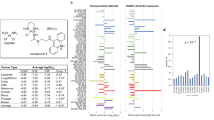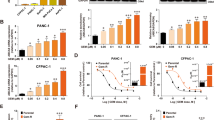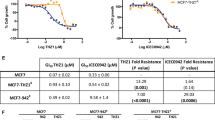Abstract
The human pancreatic tumour cell line PSN1/ADR, stepwise selected in 17-510 nM doxorubicin, displayed a multidrug resistance not conferred by P-glycoprotein (P-gp). Resistance to 17-51 nM doxorubicin was accompanied by overexpression of the vesicular marker lung resistance-related protein (LRP). Further selection in 170 nM doxorubicin led to the activation of multidrug resistance-associated protein (MRP) and to the development of drug accumulation/retention defects sensitive to verapamil. In addition, these defects were reversible by the vesicular traffic inhibitors brefeldin A, fluoroaluminate and nocodazole. In contrast, in human ovarian H134AD cells that are resistant to 1700 nM doxorubicin and used as P-gp-positive controls, the drug efflux was inhibited only by verapamil. The tyrosine kinase inhibitor genistein was a potent blocker of doxorubicin efflux in the PSN1/ADR cells but showed no activity in the H134 AD cells. The doxorubicin cytotoxicity in the PSN1/ADR cells was enhanced both by verapamil and brefeldin A, whereas in the parental PSN1 cells they demonstrated the opposite effects, being respectively sensitising and protecting. The P-gp-negative PSN1/ADR cells adapted to 510 nM doxorubicin retained brefeldin A-sensitive doxorubicin accumulation defects while MRP declined. The persistence of brefeldin A-responsive phenotype on the background of variable MRP expression suggests this agent as a useful functional probe for non-P-gp-mediated resistance to plasma-achievable doxorubicin concentrations.
This is a preview of subscription content, access via your institution
Access options
Subscribe to this journal
Receive 24 print issues and online access
$259.00 per year
only $10.79 per issue
Buy this article
- Purchase on Springer Link
- Instant access to full article PDF
Prices may be subject to local taxes which are calculated during checkout
Similar content being viewed by others
Author information
Authors and Affiliations
Rights and permissions
About this article
Cite this article
Verovski, V., Van den Berge, D., Delvaeye, M. et al. Low-level doxorubicin resistance in P-glycoprotein-negative human pancreatic tumour PSN1/ADR cells implicates a brefeldin A-sensitive mechanism of drug extrusion. Br J Cancer 73, 596–602 (1996). https://doi.org/10.1038/bjc.1996.103
Issue Date:
DOI: https://doi.org/10.1038/bjc.1996.103
This article is cited by
-
Adipocytes promote breast cancer resistance to chemotherapy, a process amplified by obesity: role of the major vault protein (MVP)
Breast Cancer Research (2019)
-
MVP and vaults: a role in the radiation response
Radiation Oncology (2011)
-
Vaults: a ribonucleoprotein particle involved in drug resistance?
Oncogene (2003)



